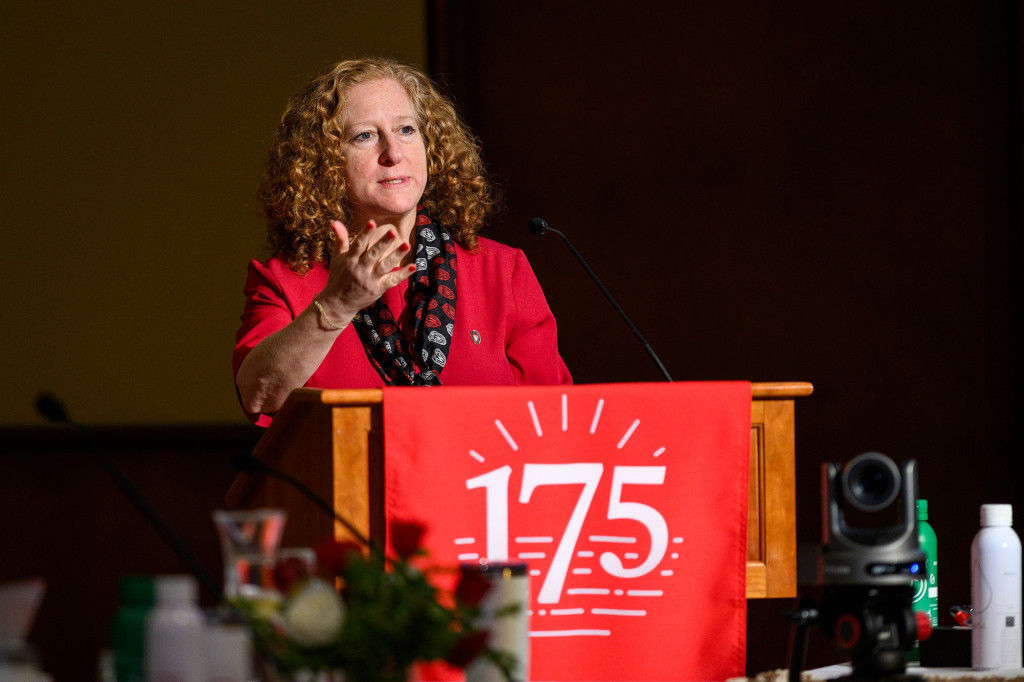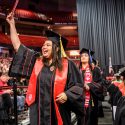In Regents address, Chancellor Mnookin unveils bold new initiatives to innovate for the public good, address global challenges

Chancellor Jennifer Mnookin announced new initiatives around sustainability and artificial intelligence in her speech to the Universities of Wisconsin Board of Regents on Feb. 8, 2024. Photo: Althea Dotzour
The University of Wisconsin—Madison will build on its 175 years of excellence with several bold new initiatives designed to address global challenges, notably artificial intelligence and environmental sustainability. In her second address before the University of Wisconsin Board of Regents today, Thursday, Feb. 8, 2024, Chancellor Jennifer L. Mnookin shared a wide-ranging look at UW–Madison’s recent successes and plans to continue innovating for the public good.
The university remains deeply committed to its ideals around inclusion and belonging, free expression, and student success, while advancing its teaching, research and outreach missions.
“We have a lot to be proud of,” Mnookin said. “My job — our job — is to make this institution even a step stronger — by building on this excellence and also by thinking in big, bold ways about where we can take a quantum leap forward to serve this state and the world on a whole new level.”
In her remarks, Mnookin outlined several areas of emphasis for the year ahead.
Wisconsin RISE
The Wisconsin Research, Innovation and Scholarly Excellence (RISE) Initiative is designed to help address significant, complex challenges of particular importance.
Wisconsin RISE builds on UW–Madison’s strengths, including the university’s broad disciplinary range and expertise in key areas, and will ensure dedicated focus and funding so the university has the infrastructure and support necessary to make transformative discoveries and translate them into real-world impact. Wisconsin RISE also builds on UW–Madison’s successful track record of connecting and collaborating with communities and industry to forge solutions.
“We’re going to look at the grand challenges facing our state and the world and grow the faculty in a targeted way that builds on our existing strengths, in places where, with strategy and investment, we can accelerate discovery and world-changing research and education, innovate for the public good … and be absolutely best in class,” Mnookin said.
UW–Madison expects to hire between 120 and 150 new faculty through the Wisconsin RISE Initiative over the next three to five years, in addition to regular hiring, reflecting around a 40 percent increase in faculty hiring.
First RISE Initiative to focus on artificial intelligence
The first area of focus under the Wisconsin RISE Initiative will be artificial intelligence (AI), which is a field with extraordinary possibility for improving the human condition that also carries with it a concerning set of risks.
AI can accelerate the pace of discovery, reflecting a seismic technological shift, but it also requires thoughtful attention to ethics and security. UW–Madison has foundational expertise across multiple research disciplines to address these realities. Making it the first area of focus will propel the university to a new level of capacity, featuring both the core scientific dimensions as well as the human-centered implications of AI.
UW–Madison faculty, staff, and students are already unlocking new applications for AI in disparate arenas — in medicine and materials science, in agriculture and communications, among many others — to answer hard questions and discover new possibilities in their research. UW–Madison researchers have employed AI to improve the diagnosis of genetic disorders, help farmers detect disease in their crops before it spreads, and to predict new materials based on the properties that would be most useful.
Over the next three to five years, RISE will accelerate the growth of UW–Madison’s network of AI innovators, adding up to 50 new faculty positions at all levels across campus to complement regular hiring already planned in AI and AI-adjacent areas.
Wisconsin RISE stands to more than double campus investment in AI and related fields than could otherwise have been achieved. New AI-focused faculty will join schools, colleges, centers, institutes and other units across campus.
Future Wisconsin RISE Initiative focus areas will be identified through a collaborative cross-campus process. Ultimately, there will be three to five areas of focus.
View full details of the initiative at rise.wisc.edu.
Environmental sustainability
Building on the university’s rich history and tradition of advancing environmental sustainability, the university is also launching a new cross-campus initiative focused on environmental sustainability, centered around five goals that include the launch of an interdisciplinary research hub.
The new initiative reflects the university’s commitment to stewardship and to addressing challenges to the state’s natural resources and a changing climate, both of which are affecting Wisconsin residents.
It also represents the most comprehensive environmental sustainability initiative in UW–Madison’s history and will advance the university’s research and education while also making campus a living laboratory for sustainable practices.
“This is a space where we’ve been pioneers in many ways — from ecology and wildlife biology to land restoration and the use of satellite technology to detect changes in the environment,” Mnookin said. “We have an impressive list of accomplishments — but these alone don’t qualify us to be a world leader in sustainability.
“What does qualify us to lead is the particular way in which we engage with the work,” she added. “Which is, quite simply, to start with looking at real-world, concrete problems. Leaning into the pragmatism that is so naturally ‘UW’.”
The initiative is structured around the following five goals:
- The launch of the Sustainability Research Hub this spring to facilitate large, interdisciplinary grants and drive sustainability innovation.
- Procuring 100% renewable electricity on campus by 2030 and achieving net-zero emissions by 2048 or sooner to drastically reduce UW–Madison’s carbon footprint, improve public health and address global climate change.
- Meeting prospective and current student demand by ensuring all interested students have access to sustainability educational experiences by 2030.
- Achieving a Zero Waste campus by 2040 by sustainably managing materials and related emissions from procurement and use to reuse or disposal.
- Achieving STARS Gold by 2025 to align UW–Madison performance with peer institutions and foster campus-wide participation in sustainability efforts.
UW–Madison will be on a course to drastically reduce campus’s environmental impact, cultivate a culture of sustainability, build climate resilience and inspire innovations that will benefit campus, the people of Wisconsin and the planet.
View full details of the initiative at sustainability.wisc.edu.
Fostering entrepreneurship
One ongoing priority Mnookin shared in her Board of Regents presentation is the institution’s efforts to take an already thriving hub of innovation and entrepreneurial excellence and make it even stronger.
A new working group, including business leaders and entrepreneurs from on and off campus will assess current practices and make recommendations, with a report expected by June.
The group will aim to knit together the many programs that already exist on this campus to make them easier to tap into and consider new and different opportunities to support the many faculty, staff and students who are interested in entrepreneurship and commercialization.
“We’re just one part of a larger ecosystem, but I believe we can and should be a leader in that system,” Mnookin said. “It’s clear to me that entrepreneurship is an area where we have opportunities to really magnify our economic impact on this state, and to shepherd life-changing innovations out into the world.”



